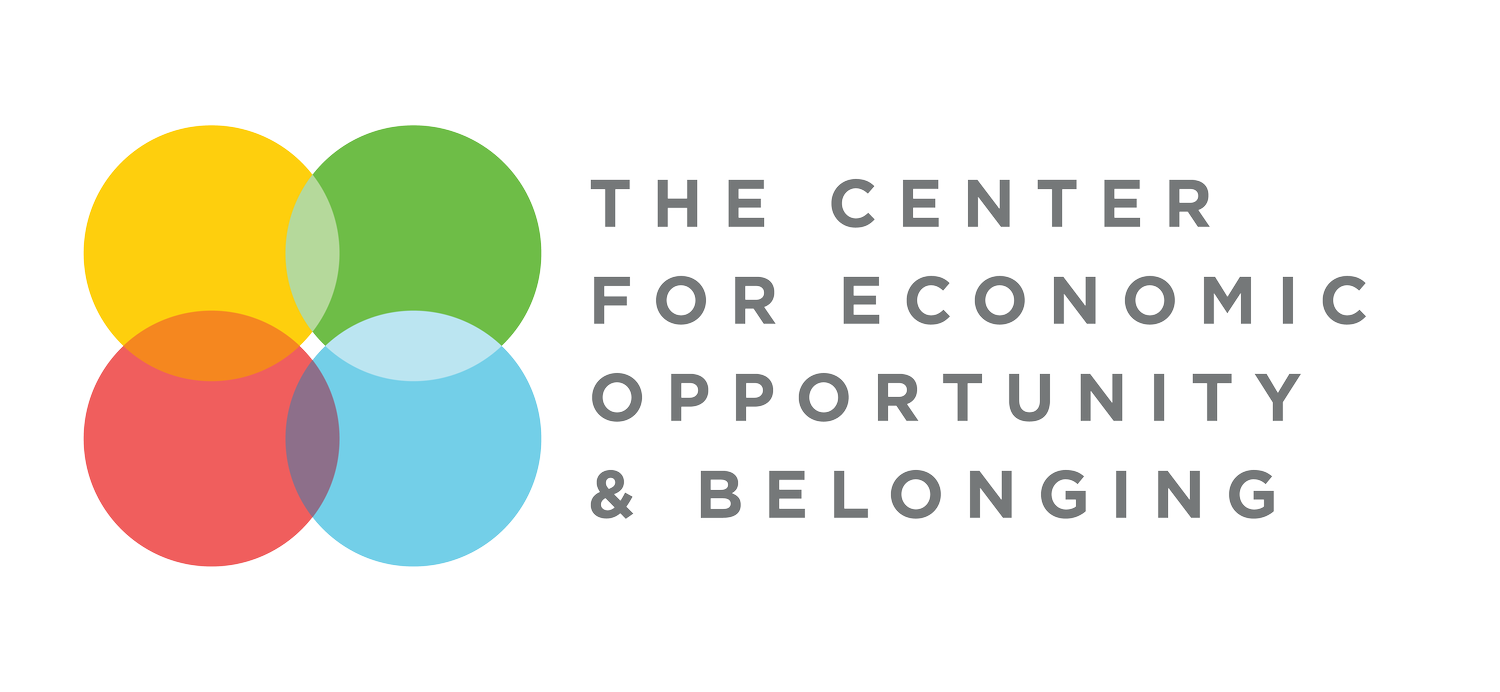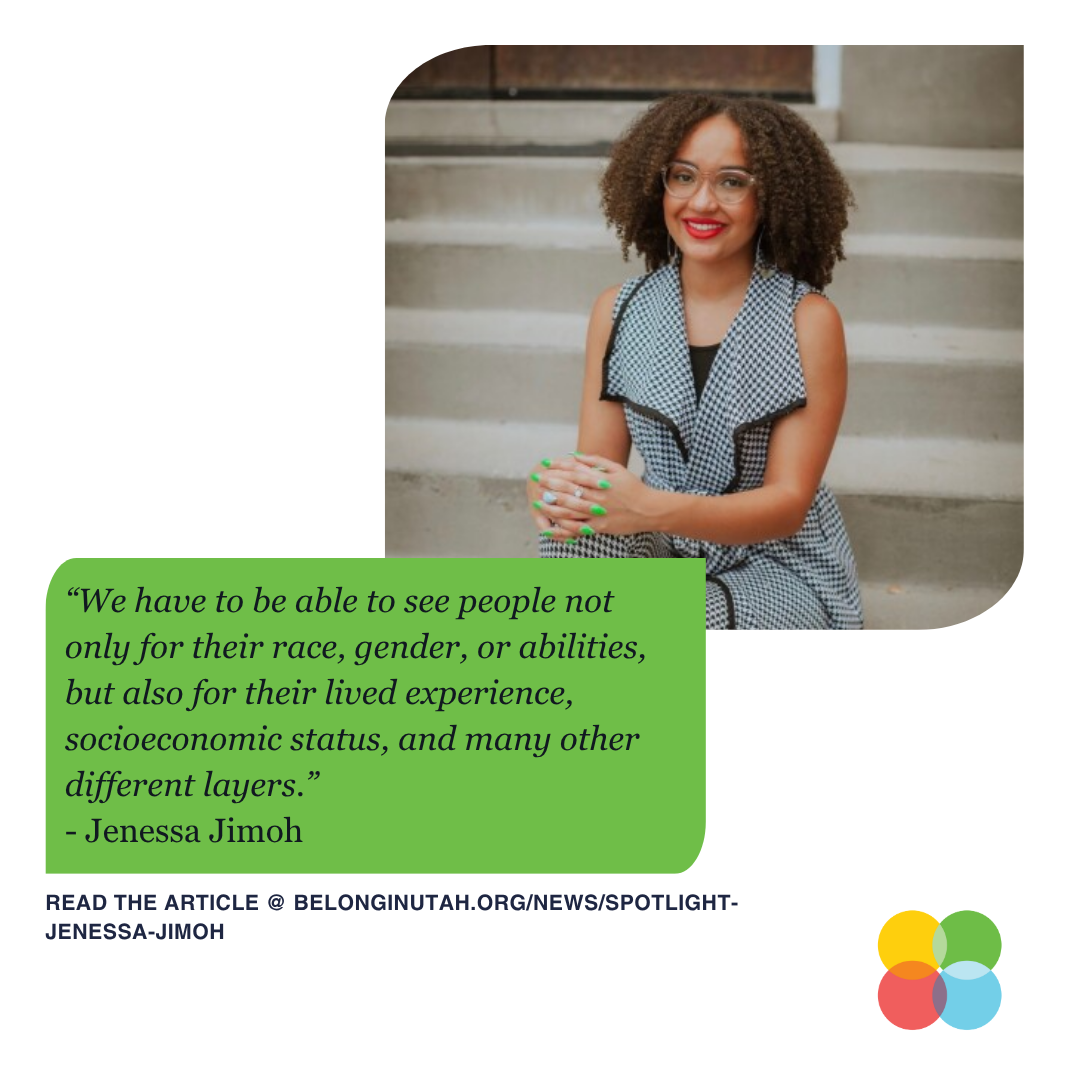Spotlight: Jenessa Jimoh
The Center for Economic Opportunity and Belonging (CEOB) is excited to continue this Spotlight series where we sit down with organizations to talk about their work and their belonging journey in Utah.
We recently sat down and spoke with Jenessa Jimoh about building belonging in Utah and her work at Ignite Utah.
In two to three sentences can you explain what you do?
Ignite Utah is a statewide Gen Z civics organization. We visit middle schools, high schools, and college campuses to teach students the importance of becoming lifelong, civically engaged individuals and how to move from transactional activism to generational movement.
What does belonging mean to you?
Belonging means being able to feel seen and heard. I feel like I belong when I'm handled with grace and care. A big part of belonging is understanding that every individual has a very unique, lived experience that they bring to this world. In society, we oftentimes think in terms of things as black and white or very monolithic. But when we look at life and individuals, we all exist within the gray. One of the biggest things I've learned in terms of belonging is just meeting people where they're at, accepting them for who they are, and building intersectional frameworks.
Can you share with us a bit of your story of finding belonging/ or your continued journey of finding belonging in Utah?
I have had to create spaces to find belonging here. I relocated here in 2016 from Virginia, and my high school was more diverse than most in Utah. But, my college was not diverse at all. One of my majors was global studies, and oftentimes when we were having very intersectional conversations, other students and I would agree that we all wished there were more spaces here in Utah for us to have these types of conversations that we weren’t having in school and that are too taboo to talk about in everyday settings, I was also feeling the need to be around community. That's how my organization, Diversity Inclusion Values Action (DIVA), was created.
Our mission is to create a safe space for people in Utah who are looking for community. There aren't many places of belonging here. I've had to create my own spaces here and advocate in a lot of the institutions on why we must have affinity groups and specific spaces for people where they can get together with people who look like them and relate to their experiences.
Going back to what you do, how do you think belonging fits into what you do/ and or your organization does?
We launched Ignite Utah with the West Side Civic Engagement Initiative. Last year, we were organizing on the west side leading up to the presidential election. I knocked door-to-door and informed people about their voting rights. Most people had never had somebody knock on their door and ask them about their ballot. I always operate from a community-based research standpoint, which means getting on the ground floor, meeting with all the stakeholders in the community, and building a strategy that includes the stakeholders. We always look to provide solutions to the problems and issues that they're facing. We were able to knock on 3500 doors. We registered 350 people to vote, and were able to get over 500 pledge to vote cards for this last election.
A big thing that I had to advocate for is the importance of centering community, and that was through events. We also focused on throwing events where people could come and just enjoy themselves and be around like-minded individuals. Not only were we focusing on getting people registered to vote, but we were also trying to identify: why don't these people care? How can we have our voices seen and heard through this movement? What can we do as marginalized people to become a part of this broader movement and empower them to get involved at the local level? We also look for meeting accessibility needs over numbers. It's hard to teach civics when you're wondering if your parent is going to still be in the US tomorrow, or if you're wondering if your lights are going to be on the next day. We focus on just meeting people where they're at and focusing on access needs.
Along with this, a lot of the stuff I've done with students is building their confidence. Especially with our young POC students out here, they don't even feel safe to show up to school. They often don't feel beautiful, and they don't feel like they belong. So, we look to empower them to believe in themselves and feel beautiful and to know that they do belong. Then, we have to think about what we can do in our communities to make sure that everybody feels like this. Entering the community is the most important thing for me in this work.
What are some things you believe we need to do as Utahns to make our state a place where everyone belongs? Or what is something someone did that helped you feel like you belong in Utah?
The very first thing that comes to mind for this question is that we need to repeal House Bill 261, also known as the anti-diversity, equity, and inclusion bill. As I've been out meeting with college students across the state, this has been one of their top issues. There is no sense of community in our schools anymore. Some of these resource centers that served us and created campus events and a community on campus are no longer there.
I think that Utahns need to take a moment to step back and look back through history and analyze why certain centers were created. Why was the Women's Center created? Why was the Black Success Center Created? Why was the Dreamer Center created? These institutions were created through decades and centuries of advocacy and discrimination, and they're not taking away from the greater good; they're adding to it.
My last point is we need to bring an intersectional perspective into the work we do and into our humanity. As I said at the beginning of this interview, we exist in the gray. We have to be able to see people for not only their race, not only for their gender, not only for their abilities, but also for their lived experience, their socioeconomic status, and so many other different layers.
“We have to be able to see people for not only their race, not only for their gender, not only for their abilities, but also for their lived experience, their socioeconomic status, and so many other different layers.”
How can people get involved?
Since we are catered towards Gen Z, social media is our biggest forefront. We know social media is where Gen Z is getting all of their information, especially when it's related to elections. Our Instagram is at Ignite.Utah, and our TikTok is at Ignite.Utah.
Our website is https://utahdonorcollaborative.com/ignite-utah/ On our website, we have a volunteer form. You can also sign up for our newsletter. We are always looking for young people to join our movement. We do know that young people only listen to young people. The fact that we are a team of Gen Z going out and educating Gen Z makes us really unique. We strive to be very adaptable to what people need. The youth are not our future, they are our NOW!

